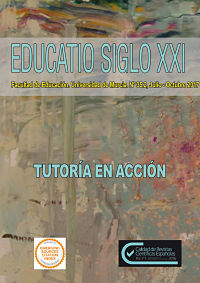Digital competence in students of educational degrees. Analysis of future teachers’ competence and perception
Abstract
Educational policies have highlighted digital
competence as a key for citizens at any
formative stage. In this way, teachers must
have developed their own digital skills to
be able to contribute to the student’s development
of their digital competence. In
this study, we aimed to analyze the integration
of Information and Communication
Technologies within Early Childhood
and Primary Education degrees and the
technological training which teachers had
received. The main objective of this study,
based on the available policies, is to explore
the perception that the students of
Educational Degrees have of their own digital
competence, using as a reference the
Digital Competence Framework for Educators published by the Spanish Ministry of
Education. We have designed a questionnaire,
which has been answered by 104
students from the Early Childhood Education
Degree and the Primary Education
Degree. Results show that students (and
future teachers) have, in general terms, an
intermediate level of digital competence,
showing good marks in the areas of Information
and Communication. The lowest
rates are linked to safety, problem solving
and creation of technological contents. It
is important to highlight that there are differences
between the personal perception
of the future teachers about their own digital
competence and the real abilities that
the marks show.
Downloads
-
Abstract2291
-
PDF (Español (España))1314
Original work publishes in this journal is subject to the following terms:
1. Murcia University Press (the publishing house) holds the copyright of the publishes work, and favours and allows their reutilization under the use license stated in point 2.
© Servicio de Publicaciones, Universidad de Murcia, 2015
2. Work is published in the electronic edition under a license (Creative Commons Reconocimiento-NoComercial-SinObraDerivada 4.0 España (legal text). They can be copied, used, disseminated, transmitted and publicly presented, as long as: i) authorship and original publication source is acknowledged (journal, publishing house and URL of the work); ii) are not used for commercial purposes; iii) the existence and specifications of this use license is stated.
3. Conditions for self-archive. Authors are allowed and encouraged to disseminate electronically the pre-pint (before review) and/or post-print (accepted for publication) versions of their work before their publication since that favours earlier circulation and dissemination resulting in an increased chance for the authors to be cited and for the work to reach a bigger share of the academic community. Colour: RoMEO: green.







